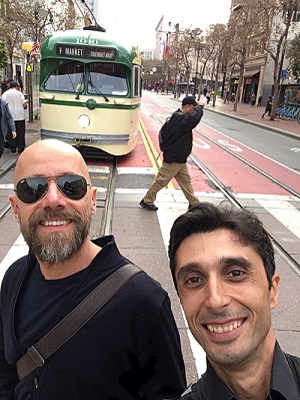7 things I Learned While Pretending To Be an Entrepreneur in Silicon Valley

When I finally had the chance I joined my ESCP Business School peer and friend Oz to see whether I could contribute in any form or shape to his health tech idea in Silicon Valley. It took me to many inspiring and impressive people, to Stanford lectures (deja vu) and to many long winded discussions around health, innovations, VC vs angel funding, the world, the election, the chance of doing good, Steve Jobs favourite restaurant and what makes for a great business model.
What do entrepreneurs need for businesses success worldwide?

Here are some observations:
1. A great idea is only as great as the business it creates
Having an idea is easy. Actually there are tons of great ideas around. But there is a shortage of great businesses. If what you have is an idea, get back in line. If you have a real business there’s plenty of help to be found. Next aim at milestones, not world domination. Having a vision is a prerequisite, but building a business requires well, business skills and shows whether you can manage Product, People and Market brilliantly or not. Can you spell” paperwork”?
2. It’s not about your idea. It’s about you
An idea is never better than the people that ride it on the rollercoaster they call the market. What the product is made of is very interesting, what you are made of is very crucial. There will be ups but surely downs. How well you can handle those are key. So prove your character, experience and resilience. Oh and yes, the idea still has to be great.
3. Listen to the dumb market – not the genius in the mirror
All great military strategies change when engaging the enemy, and all great products change when meeting its first customers. The market might not know what it wants, but chances are it will know once you engage with it. And more often than not the answer is a big NO. So iterate and ask until you get a big YES.
4. You don’t have to be first. But be better
In many newly established categories there’s only room for a couple of contenders and usually one will quickly be the “winner takes all”. So if you’re not first, be a Fast Follower that takes the category to the next level by leveraging the innovator’s market acceptance to reach bigger audiences faster by better defining the success factors. A right out differentiation however is only relevant if a big portion of the market quickly understands that your product somehow adds more value than existing offerings. Many people are in the entrepreneurial space because they want to be appreciated as smart and successful, but the successful ones are smart because they appreciate what other people want. And often that is something simpler. But sometimes it is something disruptive.
5. Do or don’t your interests align with the VC’s?
Venture Capitalists, angels or not, might seem wonderfully helpful and they have to be, in case YOU are the golden nugget. They really fear losing money. But they fear missing the next Facebook so much more. However, your interests do not always align. They use (mostly intuitive) pattern recognition to zero in on their favourites. Learn these patterns because if you somehow don’t fit you’re out. But several investors turned down Zuckerberg and pads were a failed innovation for twenty years (Newton) until Apple succeeded with the iPad. So a pattern is the right answer until it suddenly becomes the very wrong one.
6. Know the value of smart money
The professional VC’s call their money “smart”, because it usually comes with hard earned experience and useful connections. But it also comes at a price, so check out the dumb options as well. There are thousands of rich private individuals with funds to spare who would love the purpose and thrill of investing in you. And they are unlikely to have the same rigid ratios and rules as the VC’s (less predictable?). Most owners change (their attitude, motivation, risk profile etc) over the course of an ownership, so make sure the change is somehow predictable and always to the best interest of the company.
7. And lastly don’t use the U-word
The “Uber of…” list of failures is excruciatingly long and the surest way to be laughed out of a room. You might be brilliant, but make sure also to be original when pitching. Just a friendly warning (and yes, this was just before Uber’s founder went over a cliff).

Entrepreneurs & ESCP Business School Alums Aris Theophilakis and Ozcan Cilkmaz in Silicon Valley
 Aris Theophilakis is the founderand CEO of Futatsu Industries, a hybrid marketing agency based in Oslo Norway. Aris still pretends to be part of the digital health startup Hospital On Mobile. Actually he is, as the company is up and running.
Aris Theophilakis is the founderand CEO of Futatsu Industries, a hybrid marketing agency based in Oslo Norway. Aris still pretends to be part of the digital health startup Hospital On Mobile. Actually he is, as the company is up and running.
Aris is also an Alumnus of the Executive MBA (Class of 2016).
Impressed by Aris’ story and how he tackles the challenges that most entrepreneurs have to overcome to be successful? Check out how ESCP Business School and its Marketing and Creativity programmes can equip you with the tools you need in any challenge!
Useful links:
ESCP Business School
MSc in Marketing & Creativity
Executive MBA





